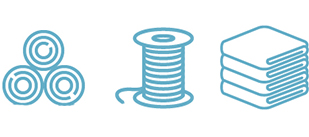Resources & Tools
Explore resources, tools, and recommendations that can help lower the barriers for implementing traceability approaches in diverse supply chains.
Learning Lab & Innovation Pilots
Beginning in 2022, STREAMS will work with implementing partners to carry out two pilots testing novel combinations of due diligence efforts and tracing approaches in the base and middle tiers of extended apparel supply chains in India (cotton, yarn, and textiles).

Mid-Tier Gatekeeper Pilot
Mid-Tier Gatekeeper Pilot: Assessing the use of due-diligence standards to exclude higher-risk goods at key supply chain nodes
Through cooperation with implementing partners including RSN and Sourcemap, the STREAMS Mid-Tier Gatekeeper Pilot focuses on enabling actors in the mid-tiers of supply chains to leverage due diligence and traceability to achieve social impact. The pilot is contributing to the development and implementation of RSN’s YESS Standard, which provides a foundation for the YESS due diligence sourcing initiative for spinners and textile mills. The pilot will also demonstrate how product tracing and supply chain mapping technologies can support and validate this due diligence initiative to achieve social impact in cotton supply chains in India.
Cotton Chain of Custody Pilot
Cotton Chain of Custody Pilot: Assessing the viability of an expanded traceability model
Through cooperation with implementing partners, including BCI, the STREAMS Cotton Chain of Custody Pilot focuses on modeling how downstream tracing technologies can best support sustainability labeling initiatives and improve community lives and well-being at the base of supply chains. The pilot is exploring the strengthening of product segregation to the gin level in cotton supply chains in India as well as the extension of additional product tracking or origin validation to higher tiers, such as spinners or textile mills.
Supply Chain Traceability Matrix – Coming Winter 2023!
STREAMS is developing the Supply Chain Traceability Matrix, a new resource that categorizes intersections between types of supply chain segments and types of tracing methodologies and that helps all stakeholders understand how different traceability approaches can be used to combat forced labor and child labor in diverse global supply chains. The Supply Chain Traceability Matrix will be a public, interactive website accessible from the STREAMS homepage.
Funding for the Supply Chain Tracing and Engagement Methodologies (STREAMS) project is provided by the U.S. Department of Labor under cooperative agreement number IL‐35805. 100 percent of the total costs of the project or program is financed with USG federal funds, for a total of 4,000,000 dollars. This material does not necessarily reflect the views or policies of the United States Department of Labor, nor does mention of trade names, commercial products, or organizations imply endorsement by the United States Government.

